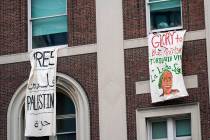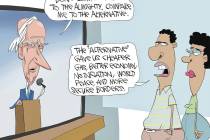Education Department should rethink politically correct college policies
Is political correctness on campus a real problem? Tellingly, it is less often defended than it is minimized. In the 1990s, it was sometimes dismissed as a conservative "myth." In recent months — with students demanding resignations, apologies and various other concessions from their administrators over perceived slights — liberals have bent over backward to insist that PC culture isn't "the real issue." When the journalist Jonathan Chait wrote an essay criticizing progressives who want to silence those who disagree with them, he was called "a sad white man" and told that political correctness doesn't exist.
One very influential liberal, however, is on Chait's side. In a recent interview, President Barack Obama said that "hearing the other side" was important for progressive activists at colleges. The alternative, he warned, was a "recipe for dogmatism." He made similar remarks at a town hall meeting in September: "I don't agree that you, when you become students at colleges, have to be coddled and protected from different points of view."
Good for him. The president could have declined to say anything about liberal intolerance. Or he could have portrayed its recent expressions as isolated incidents that have been blown out of proportion. Instead, he treated it as something worthy of criticism. That's especially praiseworthy since Obama's reproach was directed at people he considers to be basically on his side.
But the administration Obama leads hasn't been as stalwart in the defense of free speech and related values, such as procedural fairness for individuals. In fact, the Department of Education's Office for Civil Rights has often encouraged universities to work against those ideals.
Hans Bader, who used to work in that office, summarized the problem in testimony to Congress in June: "The Education Department has effectively redefined constitutionally protected speech as 'sexual harassment' even when it would not offend the reasonable person; is not severe; does not occur on school grounds; and is not gender-discriminatory." Colleges that decline to act against this expansively defined harassment face the loss of federal funding.
Earlier this year, Northwestern University professor Laura Kipnis wrote an article criticizing what she called a "sexual panic" in academia, to which federal rules on campus sexual harassment had contributed. In the ensuing controversy, the university launched an investigation into whether her writing had run afoul of federal rules. It backed down after an outcry. But where might Northwestern have gotten the idea that it should regulate what its professors write on the Internet? Maybe, Bader suggests, from the Office of Civil Rights, which has said that off-campus activity can qualify as harassment. That office has also told colleges to lower the standard of proof used for allegations of sexual harassment.
It's bad enough when universities decide to water down the rights of the accused and limit speech. It's worse when the federal government is telling them to do so. Congress hasn't forced the Obama administration to prod colleges this way: The administration is stretching the law, at the expense of traditionally liberal concepts of due process and unrestricted speech.
Obama deserves real credit for speaking up for those old ideas. If he's serious about them, he should direct his Education Department to stop undermining them.
— Ramesh Ponnuru, a Bloomberg View columnist, is a senior editor for National Review and a visiting fellow at the American Enterprise Institute.























